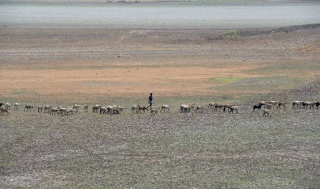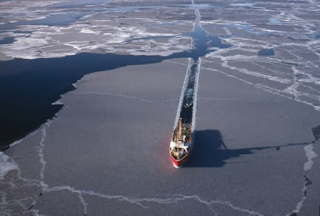Do the Australian fires impact the ocean? You bet they do.
Extinct – Chinese Paddlefish once swam alongside dinosaurs, grew up to 23 feet long, now gone. And more…
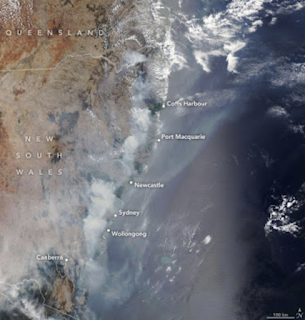 The enormity of the catastrophic fires currently ravaging Australia is hard to comprehend. Millions of acres of wilderness have succumbed to the flames in an extraordinary combination of factors that include severe weather conditions (drought, winds), human criminal activity (a number of fires have, allegedly, been deliberately set), and the more present than ever specter of climate change aggravating the conditions. Entire towns have been destroyed and millions of people in cities are being exposed to choking and unbreathable air. So far, over 18 million acres of wilderness have been affected by fire, including national parks and other protected areas. The tragic loss of life is unimaginable; already at least 24 people and over one billion mammals, birds, and reptiles have died (according to the January 8th estimate by University of Sydney ecologist Chris Dickman.) It is hard to measure the impact of climate change underwater, in a realm we can’t see. But on land, where fires rage, we can’t ignore the impact. There is no getting away from the fact that the world is changing around us and will impact everything. But how does this affect oceans?
The enormity of the catastrophic fires currently ravaging Australia is hard to comprehend. Millions of acres of wilderness have succumbed to the flames in an extraordinary combination of factors that include severe weather conditions (drought, winds), human criminal activity (a number of fires have, allegedly, been deliberately set), and the more present than ever specter of climate change aggravating the conditions. Entire towns have been destroyed and millions of people in cities are being exposed to choking and unbreathable air. So far, over 18 million acres of wilderness have been affected by fire, including national parks and other protected areas. The tragic loss of life is unimaginable; already at least 24 people and over one billion mammals, birds, and reptiles have died (according to the January 8th estimate by University of Sydney ecologist Chris Dickman.) It is hard to measure the impact of climate change underwater, in a realm we can’t see. But on land, where fires rage, we can’t ignore the impact. There is no getting away from the fact that the world is changing around us and will impact everything. But how does this affect oceans? Read more from “Save Save Foundation”
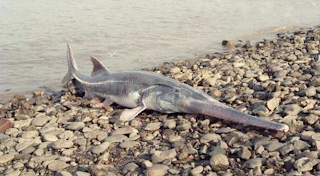 Humanity has driven the Chinese paddlefish, one of the world’s largest freshwater species, to extinction, according to a new study. The Chinese paddlefish (Psephurus gladius) lived in the Yangtze River in China and could grow up to 23 feet long. The last known sighting of the species, named for its long, paddle-like snout, was in 2003, Mongabay reports. There is one other living species of paddlefish, native to North America. “Given that the Chinese paddlefish was one of the two extant species of paddlefishes, loss of such unique and charismatic megafauna representative of freshwater ecosystems is a reprehensible and an irreparable loss,” Qiwei Wei, co-author of the study, told Mongabay.
Humanity has driven the Chinese paddlefish, one of the world’s largest freshwater species, to extinction, according to a new study. The Chinese paddlefish (Psephurus gladius) lived in the Yangtze River in China and could grow up to 23 feet long. The last known sighting of the species, named for its long, paddle-like snout, was in 2003, Mongabay reports. There is one other living species of paddlefish, native to North America. “Given that the Chinese paddlefish was one of the two extant species of paddlefishes, loss of such unique and charismatic megafauna representative of freshwater ecosystems is a reprehensible and an irreparable loss,” Qiwei Wei, co-author of the study, told Mongabay.
3. Earth posts second-hottest year on record to close out our warmest decade
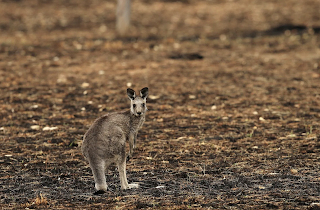 The planet registered its second-hottest year on record in 2019, capping off a five-year period that ranks as the warmest such span in recorded history. In addition, the 2010s will go down in history as the planet’s hottest decade, according to the Copernicus Climate Change Service (C3S), a science initiative of the European Union. The service, which monitors global surface temperatures, determined Earth last year was a full degree warmer (0.6 Celsius) than the 1981-2010 average. This data provides the first comprehensive global look at the state of the climate in 2019, with U.S. agencies such as NASA and the National Oceanic and Atmospheric Administration (NOAA) expected to announce similar results next week.
The planet registered its second-hottest year on record in 2019, capping off a five-year period that ranks as the warmest such span in recorded history. In addition, the 2010s will go down in history as the planet’s hottest decade, according to the Copernicus Climate Change Service (C3S), a science initiative of the European Union. The service, which monitors global surface temperatures, determined Earth last year was a full degree warmer (0.6 Celsius) than the 1981-2010 average. This data provides the first comprehensive global look at the state of the climate in 2019, with U.S. agencies such as NASA and the National Oceanic and Atmospheric Administration (NOAA) expected to announce similar results next week.
4. New study links daily weather patterns to climate change for first time
Scientists have for the first time linked human-induced climate change and global daily weather patterns in a new study. The report, released Thursday in Nature Climate Change, could mark a transformation in long-held beliefs about the separation between daily weather and long-term climate change. The study also suggests that measurements analyzing humankind’s role in producing incidents such as heatwaves and floods could underestimate the contribution people make to such extreme weather events. The study concludes that patterns of global temperature and humidity have human factors and are distinct from natural variability. It also determines that the long-term rise in global average temperature can be predicted with one day’s weather information worldwide.
 The Trump administration has the highest number of unfunded construction projects at major hazardous waste sites of the last 15 years, according to data released by the Environmental Protection Agency (EPA) over the holidays. The figures released by the agency focus on projects at Superfund sites, highlighting a backlog of work designed to clean up dangerous contamination. In 2019, the EPA did not have funding to begin work on 34 Superfund sites, a number more than 50 percent above the highest figures from the Obama administration.
The Trump administration has the highest number of unfunded construction projects at major hazardous waste sites of the last 15 years, according to data released by the Environmental Protection Agency (EPA) over the holidays. The figures released by the agency focus on projects at Superfund sites, highlighting a backlog of work designed to clean up dangerous contamination. In 2019, the EPA did not have funding to begin work on 34 Superfund sites, a number more than 50 percent above the highest figures from the Obama administration.
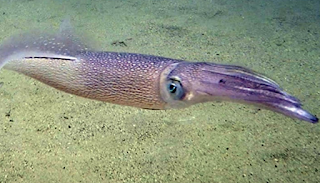 Exposure to underwater pile driving noise, which can be associated with the construction of docks, piers, and offshore wind farms, causes squid to exhibit strong alarm behaviors, according to a study by Woods Hole Oceanographic Institution (WHOI) researchers published Dec. 19, 2019, in the journal Marine Pollution Bulletin. “This study is the first to report behavioral effects of pile driving noise on any cephalopod, a group including squid, cuttlefish, and octopuses,” says lead author Ian Jones, a student in the Massachusetts Institute of Technology-Woods Hole Oceanographic Institution Joint Program in Oceanography.
Exposure to underwater pile driving noise, which can be associated with the construction of docks, piers, and offshore wind farms, causes squid to exhibit strong alarm behaviors, according to a study by Woods Hole Oceanographic Institution (WHOI) researchers published Dec. 19, 2019, in the journal Marine Pollution Bulletin. “This study is the first to report behavioral effects of pile driving noise on any cephalopod, a group including squid, cuttlefish, and octopuses,” says lead author Ian Jones, a student in the Massachusetts Institute of Technology-Woods Hole Oceanographic Institution Joint Program in Oceanography. 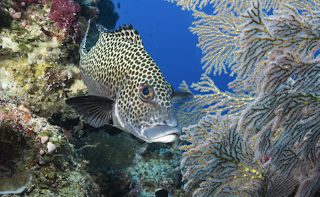 Legislation for the sanctuary was passed four years ago to come into effect in 2020. The Palau National Marine Sanctuary will cover an area of about 500,000 square kilometers – the nation’s Exclusive Economic Zone (EEZ). The sanctuary places a ban on any extractive activities, including fishing, mining, trans-shipment and shark finning, among others. President Tommy Remengesau said he was happy that the pioneering initiative would finally “come into fruition”. “It is a very ambitious and worthy goal for Palau’s future. “Hopefully the marine sanctuary will always stand as a reminder [that] we have to live and respect the environment because the environment is the nest of life, and without the next nobody in Palau can survive,” Mr Remengesau said. Eighty percent of the designated zone will be a no-take marine protected area, but fishing will be allowed, under strict conditions in the remaining 20 percent.
Legislation for the sanctuary was passed four years ago to come into effect in 2020. The Palau National Marine Sanctuary will cover an area of about 500,000 square kilometers – the nation’s Exclusive Economic Zone (EEZ). The sanctuary places a ban on any extractive activities, including fishing, mining, trans-shipment and shark finning, among others. President Tommy Remengesau said he was happy that the pioneering initiative would finally “come into fruition”. “It is a very ambitious and worthy goal for Palau’s future. “Hopefully the marine sanctuary will always stand as a reminder [that] we have to live and respect the environment because the environment is the nest of life, and without the next nobody in Palau can survive,” Mr Remengesau said. Eighty percent of the designated zone will be a no-take marine protected area, but fishing will be allowed, under strict conditions in the remaining 20 percent.
Several environmental groups filed a lawsuit Wednesday claiming several agencies in the Trump administration have failed to protect green sea turtle habitat as required by the Endangered Species Act. The lawsuit, filed in U.S. District Court for the District of Columbia, says the turtles’ nesting beaches in Florida, Georgia, North Carolina, and South Carolina, as well as their ocean habitat, face threats from sea-level rise brought on by climate change and plastic pollution, according to a news release from the Center for Biological Diversity, one of the plaintiffs.
———————————————–


